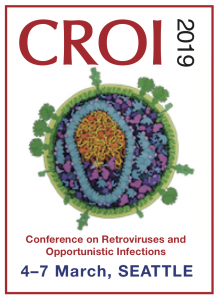Bedaquiline and delamanid safe when given together to treat drug resistant TB
28 March 2019. Related: Conference reports, TB coinfection, CROI 26 (Retrovirus) 2019.
 Polly Clayden, HIV i-Base
Polly Clayden, HIV i-Base
QT interval prolongation effects of bedaquiline (BDQ) and delamanid (DLM) given together were no more than additive in a study looking at cardiac safety of the combined use of these drugs in people with multidrug resistant (MDR)-TB.
Data from the ACTG A5343 (DELIBERATE) trial were presented at CROI 2019.
BDQ and DLM are the first drugs from two new classes approved for TB in over 40 years. Both are recommended by WHO for treatment of MDR-TB by WHO.
Both drugs’ metabolites prolong the QT interval. Peak QT effects are at 16–18 weeks for BDQ and 8 weeks for DLM. The cardiac safety of these drugs given together as part of a regimen to treat MDR-TB has not been previously studied.
DELIBERATE was a phase 2, randomised, open-label, three arm pharmacokinetic and safety trial. Adults with MDR-TB, receiving multidrug background treatment (MBT), were randomised 1:1:1 to receive BDQ, DLM or both (BDQ + DLM) for 24 weeks.
The primary objective was to compare mean change from baseline in QTcF (in ms; averaged over weeks 8–24) when BDQ and DLM are given together to the mean change when each drug is given alone.
People with QTcF >450 ms or CD4 count <100 cells/mm3 were excluded. Clofazamine was not permitted and moxifloxacin was switched to levofloxacin. HIV positive participants received dolutegravir-based ART.
Three electrocardiograms (ECG) were performed at baseline, every two weeks for 24 weeks, then week 28.
A core laboratory blinded to treatment arm calculated QTcF. The study defined grade 3 QTcF prolongation as >500ms or >480 ms with increase from baseline >60 ms. Grade 4 was life-threatening dysrhythmia.
Sites were in South Africa and Peru. Gary Maartens from the University of Cape Town presented these findings on behalf of the DELIBERATE investigators.
Eighty-four participants were enrolled. Most (75%) were men, median age was 35 years and 37% were HIV positive.
Mean baseline QTcF and standard deviations in the BDQ, DLM and BDQ + DLM arms were respectively: 398 (24), 404 (19) and 391 (14).
Of 74 participants with QTc data, mean change in QTcF from baseline in the respective arms was: 11.9 (95% CI 7.4 to 16.5), 8.6 (95% CI 4.0 to 13.2) and 20.7 (95% CI 16.1 to 25.4).
There were no Grade 3 or 4 QT interval prolongation events.
The investigators concluded that the combined effect on the QTcF interval of co-administration of BDQ and DLM is clinically modest and no more than additive.
comment
The investigators also noted the caveat that this was a carefully-screened population not receiving other DR-TB drugs that have significant QT prolongation effects (clofazimine and moxifloxacin).
Reference
Dooley KE et al. QT effects of bedaquiline, delamanid or both in MDR-TB patients: The Deliberate trial.
CROI 2019. Seattle. 4–7 March 2019. Oral abstract 84LB.
http://www.croiconference.org/sessions/qt-effects-bedaquiline-delamanid-or-both-mdr-tb-patients-deliberate-trial (abstract)
http://www.croiwebcasts.org/console/player/41181 (webcast)

